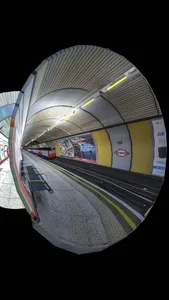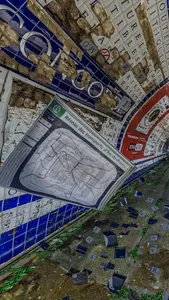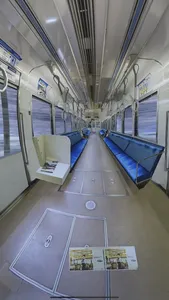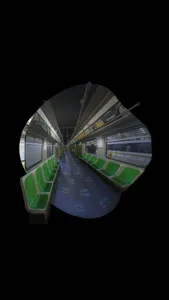NON-PLACES
In his travels before and especially after the pandemic, Roberto Lombana have had this
feeling related to non-places. A term coined by Mark Augé that refers to those transit spaces
we encounter and don’t give too much attention to as we move from one place to another.
One of those spaces that catch Robert´s
attention was the subway and subway
stations. Its functional and durable
design aesthetic responds to each
particular city and culture that
communicates the values of a society
in its historical moment.
For instance, if we compare a subway
car in London or Tokyo, Medellin or
Paris, we can appreciate four different
visions and esthetic expressions that
correspond to these parts of the world.
Back to his original feeling, you might
ask, but why does he paints these
subway cars without people? Lombana
continued taking photos to do his
paintings, as he continued traveling, he
wondered what would happen to these
spaces if there was a natural disaster, a
nuclear event like Fukuyama or the world heats up a few degrees. People would not continue
to come here to transit from one place to another. These non-spaces would remain
empty. Roberto´s premonition came true shortly after that. When humanity suffered the
pandemic, these spaces became empty.
This work reminds us that as we move from one place to another, there is a space that no
one owns, and others are in charge of designing and up-keeping. Invaluable to human
existence as it serves the purpose of connecting us all.
This series of paintings are the result of a spatial and perceptual experience mediated by
photography, converted to mixed media canvas in a homage to Richard Estes that translates
photography into a painting
In his travels before and especially after the pandemic, Roberto Lombana have had this
feeling related to non-places. A term coined by Mark Augé that refers to those transit spaces
we encounter and don’t give too much attention to as we move from one place to another.
One of those spaces that catch Robert´s
attention was the subway and subway
stations. Its functional and durable
design aesthetic responds to each
particular city and culture that
communicates the values of a society
in its historical moment.
For instance, if we compare a subway
car in London or Tokyo, Medellin or
Paris, we can appreciate four different
visions and esthetic expressions that
correspond to these parts of the world.
Back to his original feeling, you might
ask, but why does he paints these
subway cars without people? Lombana
continued taking photos to do his
paintings, as he continued traveling, he
wondered what would happen to these
spaces if there was a natural disaster, a
nuclear event like Fukuyama or the world heats up a few degrees. People would not continue
to come here to transit from one place to another. These non-spaces would remain
empty. Roberto´s premonition came true shortly after that. When humanity suffered the
pandemic, these spaces became empty.
This work reminds us that as we move from one place to another, there is a space that no
one owns, and others are in charge of designing and up-keeping. Invaluable to human
existence as it serves the purpose of connecting us all.
This series of paintings are the result of a spatial and perceptual experience mediated by
photography, converted to mixed media canvas in a homage to Richard Estes that translates
photography into a painting
Show More



